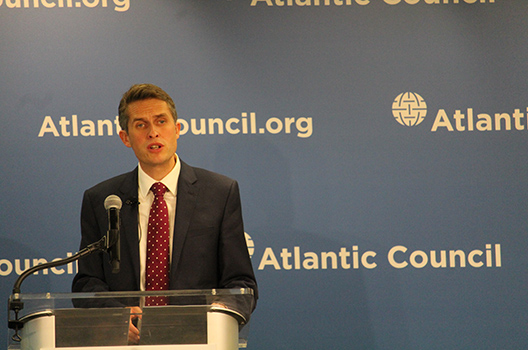 “Brexit is Britain’s moment to look up, be more ambitious, and redefine our place in the world,” United Kingdom Secretary of State for Defence, Gavin Williamson, said on August 7. Speaking at the Atlantic Council in Washington, Williamson sought to assure those “worrying about Brexit and what role Britain will play in the world,” that the United Kingdom will “remain a nation that champions those fundamental values of freedom, democracy, and tolerance.”
“Brexit is Britain’s moment to look up, be more ambitious, and redefine our place in the world,” United Kingdom Secretary of State for Defence, Gavin Williamson, said on August 7. Speaking at the Atlantic Council in Washington, Williamson sought to assure those “worrying about Brexit and what role Britain will play in the world,” that the United Kingdom will “remain a nation that champions those fundamental values of freedom, democracy, and tolerance.”
Rebutting criticism that the United Kingdom’s pending withdrawal from the European Union would weaken Britain’s influence in the world, Williamson said “never underestimate my nation.”
Williamson’s visit to Washington came amidst reports that London is preparing for the possibility that it may need to exit the European Union without a formal “deal” with Brussels outlining future trade relations and cooperation projects. On July 26, the EU’s chief Brexit negotiator, Michel Barnier, rejected UK Prime Minister Theresa May’s plan to retain a customs union between the two countries. This followed an announcement in June that Brussels would not allow Britain to fully participate in the European Union’s common foreign and defense policies, a blow to those who believed London could still play a key role in European security issues after Brexit.
Williamson defended Britain’s decision to leave the European Union, saying that “in some ways the EU has limited our vision and discouraged us from looking at the horizon. Now we are being freed to reach further and aim higher.” When pushed by event moderator Deborah Lee James, former Secretary of the US Air Force, if Brexit would have a negative impact on London’s ability to act as a security actor, Williamson responded that Brexit would have “no impact in terms of the security and defense of Europe,” or Britain’s position as a global power.
Williamson argued that the United Kingdom remains one of the world’s most powerful actors, and that its “willingness to act” will allow it to not only sustain, but also build its global influence after Brexit. Britain’s armed forces “are ready to respond to any situation, at a moment’s notice” and have “a willingness to operate where others cannot or will not go.”
Williamson highlighted the gap between the United Kingdom and its European counterparts in terms of hard power assets (such as strategic lift and military helicopters) and forward deployment capabilities in its overseas territories as evidence of the value a post-Brexit Britain will still offer the United States and London’s other allies. He specifically focused on Britain’s track record of actively contributing to global security, saying that when the United Kingdom “realize[s] that it is in our interests or when it is right, we as a nation always act.”
The United Kingdom’s continued partnership with the United States will be key to Britain’s future global ambitions, Williamson argued. “The United States has never had nor will have a more reliable ally than Great Britain. Others may pretend – but you will find no greater ally than us.”
Williamson pointed to the many benefits the United Kingdom will still provide the United States after Brexit, especially in terms of hard power. While “some mistakenly believe that only America can develop cutting edge technologies or capabilities,” Williamson said, “that has never been and never will be the case. The UK has always brought something to special the table.” The British defense industry creates more than one million jobs for American citizens and the United Kingdom “is the biggest offshore supplier to the US military,” according to Williamson. The United States is London’s “greatest ally,” Williamson said, adding that “we will always be the most natural of partners together.” In remarks introducing Williamson, General James L. Jones, former Commander of US European Command, NATO Supreme Allied Commander Europe, and interim Chair of the Atlantic Council, agreed that the United States and United Kingdom “are more than allies, we are friends.”
Williamson was careful to note that the UK-US special relationship was rooted deeply in the transatlantic alliance. NATO, Williamson said, is “the greatest guarantor of security” in Europe and “just as the UK helps the United States shoulder the burden of international security, so does NATO.” Williamson praised the new contributions European allies were making towards common defense and reminded those in attendance that “European nations are not [NATO’s] sole beneficiary.” When asked about President Donald J. Trump’s commitment to NATO, Williamson pointed to the significant American financial and military support for the Alliance, saying “you judge a nation on their actions.”
Despite the concerns from many about London’s future role after Brexit, Williamson said that he was “profoundly optimistic about our future.” The United Kingdom has a track record of “changing the world time and time again,” he said, “and we will [continue to] change the world in the future.”
David A. Wemer is assistant director, editorial at the Atlantic Council. You can follow him on Twitter @DavidAWemer.
Image: Gavin Williamson, the United Kingdom's Secretary of State for Defence, speaks at the Atlantic Council on August 7.
